A Philosophical Exploration: The Existence of God and Key Arguments
VerifiedAdded on 2023/05/29
|11
|2822
|433
Essay
AI Summary
This essay delves into the philosophical arguments surrounding the existence of God, focusing on the ontological, teleological, and moral perspectives. The ontological argument, originating from Anselm of Canterbury, posits that the very concept of God as a perfect being implies existence. Thinkers like Rene Descartes and Gottfried Leibniz further developed this line of reasoning. The teleological argument, also known as the design argument, suggests that the intricate design of the natural world points to a creator. William Paley's watchmaker analogy exemplifies this view. The moral argument asserts that the existence of objective morality necessitates a divine source. The essay also addresses attributes of God, such as omniscience, omnipotence, and omnipresence, and considers arguments against these attributes. It concludes by examining how these attributes are understood both within and outside the presuppositions of faith. Desklib provides students access to past papers and solutions to aid their academic pursuits.
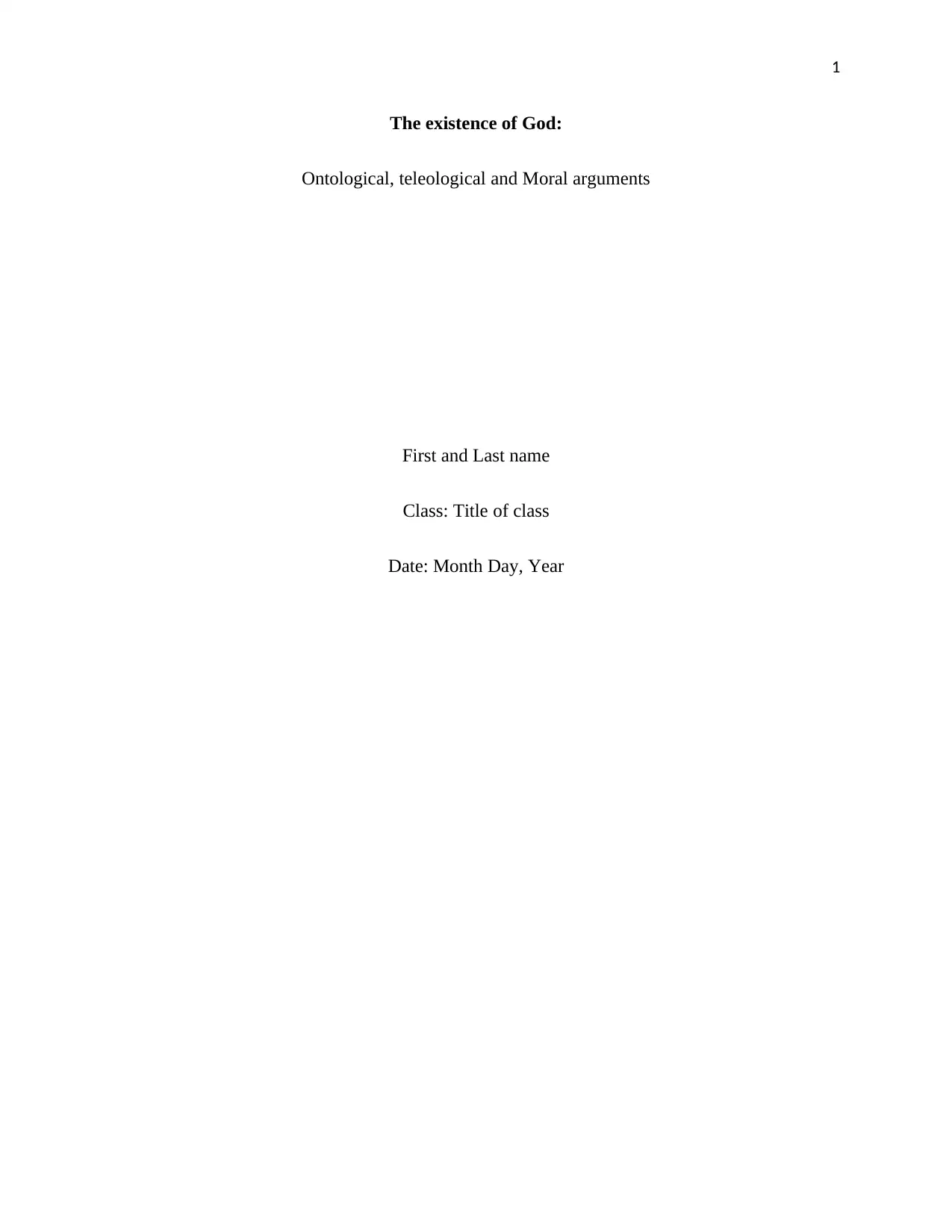
1
The existence of God:
Ontological, teleological and Moral arguments
First and Last name
Class: Title of class
Date: Month Day, Year
The existence of God:
Ontological, teleological and Moral arguments
First and Last name
Class: Title of class
Date: Month Day, Year
Paraphrase This Document
Need a fresh take? Get an instant paraphrase of this document with our AI Paraphraser
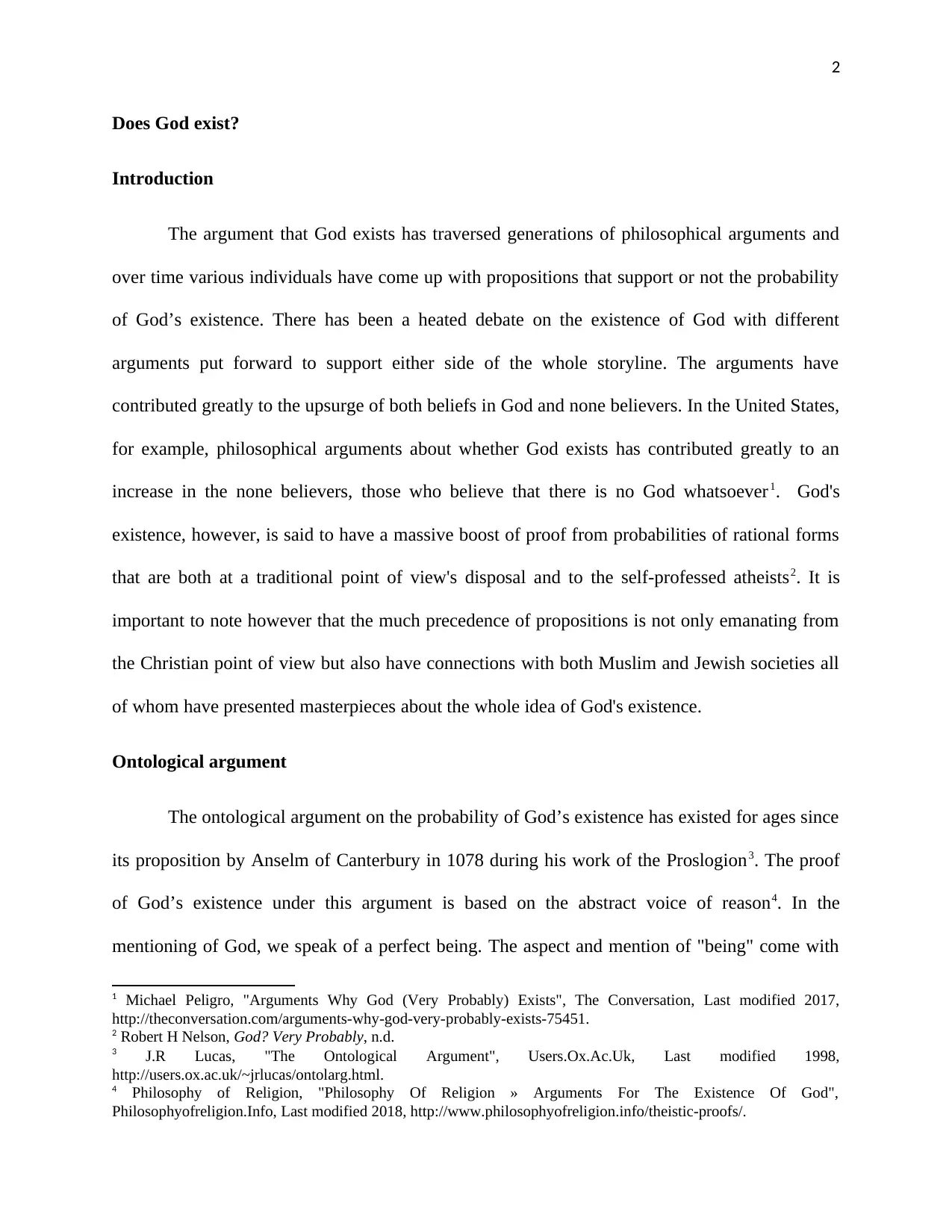
2
Does God exist?
Introduction
The argument that God exists has traversed generations of philosophical arguments and
over time various individuals have come up with propositions that support or not the probability
of God’s existence. There has been a heated debate on the existence of God with different
arguments put forward to support either side of the whole storyline. The arguments have
contributed greatly to the upsurge of both beliefs in God and none believers. In the United States,
for example, philosophical arguments about whether God exists has contributed greatly to an
increase in the none believers, those who believe that there is no God whatsoever1. God's
existence, however, is said to have a massive boost of proof from probabilities of rational forms
that are both at a traditional point of view's disposal and to the self-professed atheists2. It is
important to note however that the much precedence of propositions is not only emanating from
the Christian point of view but also have connections with both Muslim and Jewish societies all
of whom have presented masterpieces about the whole idea of God's existence.
Ontological argument
The ontological argument on the probability of God’s existence has existed for ages since
its proposition by Anselm of Canterbury in 1078 during his work of the Proslogion3. The proof
of God’s existence under this argument is based on the abstract voice of reason4. In the
mentioning of God, we speak of a perfect being. The aspect and mention of "being" come with
1 Michael Peligro, "Arguments Why God (Very Probably) Exists", The Conversation, Last modified 2017,
http://theconversation.com/arguments-why-god-very-probably-exists-75451.
2 Robert H Nelson, God? Very Probably, n.d.
3 J.R Lucas, "The Ontological Argument", Users.Ox.Ac.Uk, Last modified 1998,
http://users.ox.ac.uk/~jrlucas/ontolarg.html.
4 Philosophy of Religion, "Philosophy Of Religion » Arguments For The Existence Of God",
Philosophyofreligion.Info, Last modified 2018, http://www.philosophyofreligion.info/theistic-proofs/.
Does God exist?
Introduction
The argument that God exists has traversed generations of philosophical arguments and
over time various individuals have come up with propositions that support or not the probability
of God’s existence. There has been a heated debate on the existence of God with different
arguments put forward to support either side of the whole storyline. The arguments have
contributed greatly to the upsurge of both beliefs in God and none believers. In the United States,
for example, philosophical arguments about whether God exists has contributed greatly to an
increase in the none believers, those who believe that there is no God whatsoever1. God's
existence, however, is said to have a massive boost of proof from probabilities of rational forms
that are both at a traditional point of view's disposal and to the self-professed atheists2. It is
important to note however that the much precedence of propositions is not only emanating from
the Christian point of view but also have connections with both Muslim and Jewish societies all
of whom have presented masterpieces about the whole idea of God's existence.
Ontological argument
The ontological argument on the probability of God’s existence has existed for ages since
its proposition by Anselm of Canterbury in 1078 during his work of the Proslogion3. The proof
of God’s existence under this argument is based on the abstract voice of reason4. In the
mentioning of God, we speak of a perfect being. The aspect and mention of "being" come with
1 Michael Peligro, "Arguments Why God (Very Probably) Exists", The Conversation, Last modified 2017,
http://theconversation.com/arguments-why-god-very-probably-exists-75451.
2 Robert H Nelson, God? Very Probably, n.d.
3 J.R Lucas, "The Ontological Argument", Users.Ox.Ac.Uk, Last modified 1998,
http://users.ox.ac.uk/~jrlucas/ontolarg.html.
4 Philosophy of Religion, "Philosophy Of Religion » Arguments For The Existence Of God",
Philosophyofreligion.Info, Last modified 2018, http://www.philosophyofreligion.info/theistic-proofs/.
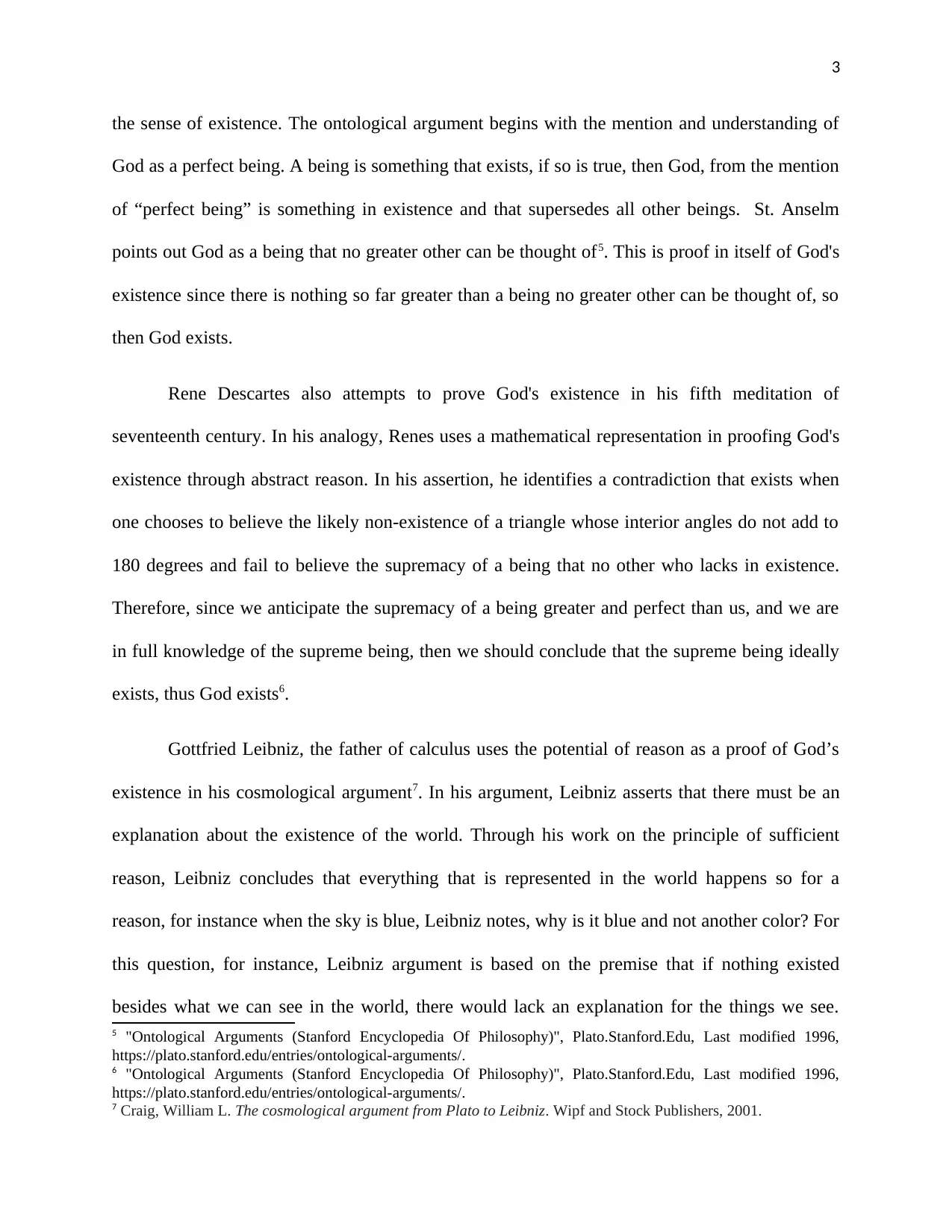
3
the sense of existence. The ontological argument begins with the mention and understanding of
God as a perfect being. A being is something that exists, if so is true, then God, from the mention
of “perfect being” is something in existence and that supersedes all other beings. St. Anselm
points out God as a being that no greater other can be thought of5. This is proof in itself of God's
existence since there is nothing so far greater than a being no greater other can be thought of, so
then God exists.
Rene Descartes also attempts to prove God's existence in his fifth meditation of
seventeenth century. In his analogy, Renes uses a mathematical representation in proofing God's
existence through abstract reason. In his assertion, he identifies a contradiction that exists when
one chooses to believe the likely non-existence of a triangle whose interior angles do not add to
180 degrees and fail to believe the supremacy of a being that no other who lacks in existence.
Therefore, since we anticipate the supremacy of a being greater and perfect than us, and we are
in full knowledge of the supreme being, then we should conclude that the supreme being ideally
exists, thus God exists6.
Gottfried Leibniz, the father of calculus uses the potential of reason as a proof of God’s
existence in his cosmological argument7. In his argument, Leibniz asserts that there must be an
explanation about the existence of the world. Through his work on the principle of sufficient
reason, Leibniz concludes that everything that is represented in the world happens so for a
reason, for instance when the sky is blue, Leibniz notes, why is it blue and not another color? For
this question, for instance, Leibniz argument is based on the premise that if nothing existed
besides what we can see in the world, there would lack an explanation for the things we see.
5 "Ontological Arguments (Stanford Encyclopedia Of Philosophy)", Plato.Stanford.Edu, Last modified 1996,
https://plato.stanford.edu/entries/ontological-arguments/.
6 "Ontological Arguments (Stanford Encyclopedia Of Philosophy)", Plato.Stanford.Edu, Last modified 1996,
https://plato.stanford.edu/entries/ontological-arguments/.
7 Craig, William L. The cosmological argument from Plato to Leibniz. Wipf and Stock Publishers, 2001.
the sense of existence. The ontological argument begins with the mention and understanding of
God as a perfect being. A being is something that exists, if so is true, then God, from the mention
of “perfect being” is something in existence and that supersedes all other beings. St. Anselm
points out God as a being that no greater other can be thought of5. This is proof in itself of God's
existence since there is nothing so far greater than a being no greater other can be thought of, so
then God exists.
Rene Descartes also attempts to prove God's existence in his fifth meditation of
seventeenth century. In his analogy, Renes uses a mathematical representation in proofing God's
existence through abstract reason. In his assertion, he identifies a contradiction that exists when
one chooses to believe the likely non-existence of a triangle whose interior angles do not add to
180 degrees and fail to believe the supremacy of a being that no other who lacks in existence.
Therefore, since we anticipate the supremacy of a being greater and perfect than us, and we are
in full knowledge of the supreme being, then we should conclude that the supreme being ideally
exists, thus God exists6.
Gottfried Leibniz, the father of calculus uses the potential of reason as a proof of God’s
existence in his cosmological argument7. In his argument, Leibniz asserts that there must be an
explanation about the existence of the world. Through his work on the principle of sufficient
reason, Leibniz concludes that everything that is represented in the world happens so for a
reason, for instance when the sky is blue, Leibniz notes, why is it blue and not another color? For
this question, for instance, Leibniz argument is based on the premise that if nothing existed
besides what we can see in the world, there would lack an explanation for the things we see.
5 "Ontological Arguments (Stanford Encyclopedia Of Philosophy)", Plato.Stanford.Edu, Last modified 1996,
https://plato.stanford.edu/entries/ontological-arguments/.
6 "Ontological Arguments (Stanford Encyclopedia Of Philosophy)", Plato.Stanford.Edu, Last modified 1996,
https://plato.stanford.edu/entries/ontological-arguments/.
7 Craig, William L. The cosmological argument from Plato to Leibniz. Wipf and Stock Publishers, 2001.
⊘ This is a preview!⊘
Do you want full access?
Subscribe today to unlock all pages.

Trusted by 1+ million students worldwide
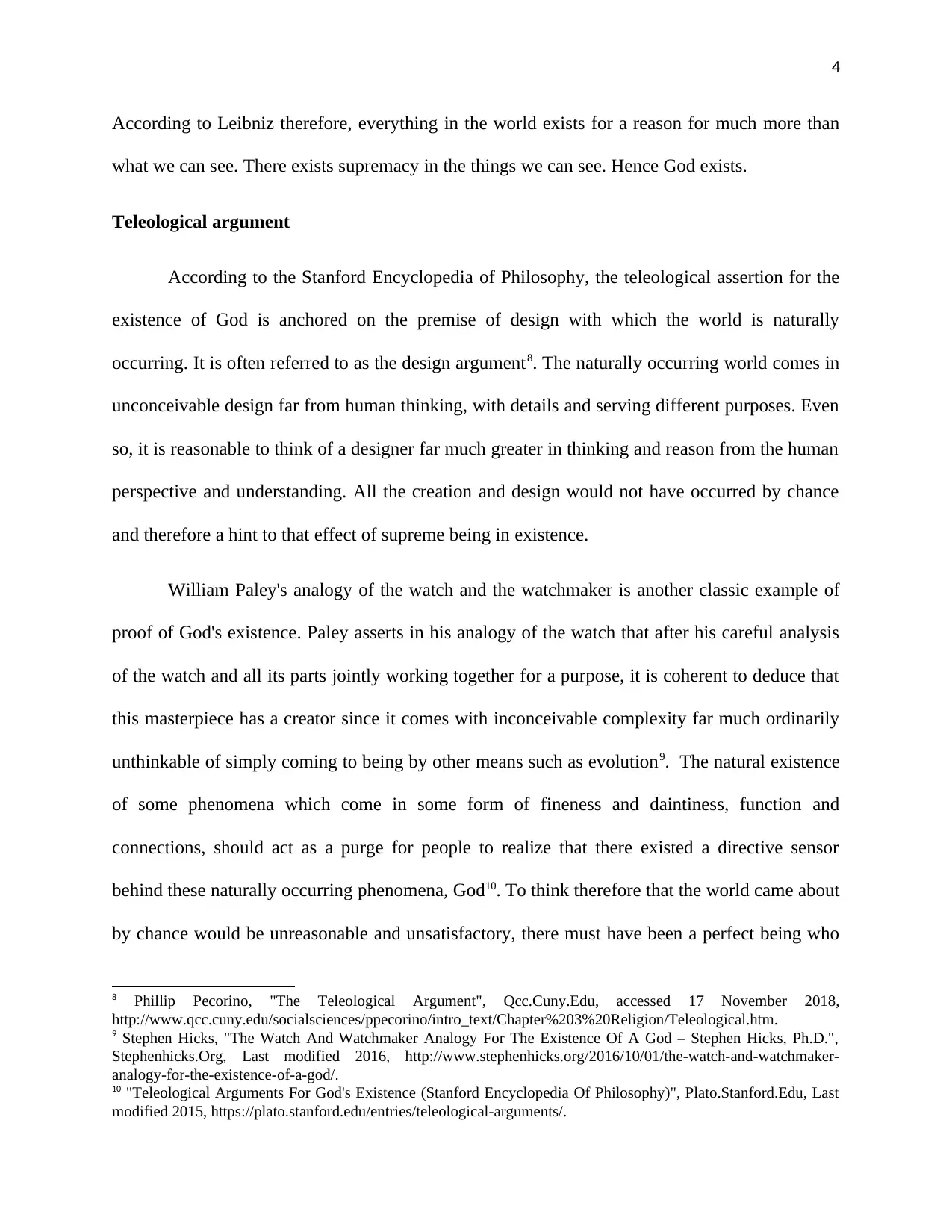
4
According to Leibniz therefore, everything in the world exists for a reason for much more than
what we can see. There exists supremacy in the things we can see. Hence God exists.
Teleological argument
According to the Stanford Encyclopedia of Philosophy, the teleological assertion for the
existence of God is anchored on the premise of design with which the world is naturally
occurring. It is often referred to as the design argument8. The naturally occurring world comes in
unconceivable design far from human thinking, with details and serving different purposes. Even
so, it is reasonable to think of a designer far much greater in thinking and reason from the human
perspective and understanding. All the creation and design would not have occurred by chance
and therefore a hint to that effect of supreme being in existence.
William Paley's analogy of the watch and the watchmaker is another classic example of
proof of God's existence. Paley asserts in his analogy of the watch that after his careful analysis
of the watch and all its parts jointly working together for a purpose, it is coherent to deduce that
this masterpiece has a creator since it comes with inconceivable complexity far much ordinarily
unthinkable of simply coming to being by other means such as evolution9. The natural existence
of some phenomena which come in some form of fineness and daintiness, function and
connections, should act as a purge for people to realize that there existed a directive sensor
behind these naturally occurring phenomena, God10. To think therefore that the world came about
by chance would be unreasonable and unsatisfactory, there must have been a perfect being who
8 Phillip Pecorino, "The Teleological Argument", Qcc.Cuny.Edu, accessed 17 November 2018,
http://www.qcc.cuny.edu/socialsciences/ppecorino/intro_text/Chapter%203%20Religion/Teleological.htm.
9 Stephen Hicks, "The Watch And Watchmaker Analogy For The Existence Of A God – Stephen Hicks, Ph.D.",
Stephenhicks.Org, Last modified 2016, http://www.stephenhicks.org/2016/10/01/the-watch-and-watchmaker-
analogy-for-the-existence-of-a-god/.
10 "Teleological Arguments For God's Existence (Stanford Encyclopedia Of Philosophy)", Plato.Stanford.Edu, Last
modified 2015, https://plato.stanford.edu/entries/teleological-arguments/.
According to Leibniz therefore, everything in the world exists for a reason for much more than
what we can see. There exists supremacy in the things we can see. Hence God exists.
Teleological argument
According to the Stanford Encyclopedia of Philosophy, the teleological assertion for the
existence of God is anchored on the premise of design with which the world is naturally
occurring. It is often referred to as the design argument8. The naturally occurring world comes in
unconceivable design far from human thinking, with details and serving different purposes. Even
so, it is reasonable to think of a designer far much greater in thinking and reason from the human
perspective and understanding. All the creation and design would not have occurred by chance
and therefore a hint to that effect of supreme being in existence.
William Paley's analogy of the watch and the watchmaker is another classic example of
proof of God's existence. Paley asserts in his analogy of the watch that after his careful analysis
of the watch and all its parts jointly working together for a purpose, it is coherent to deduce that
this masterpiece has a creator since it comes with inconceivable complexity far much ordinarily
unthinkable of simply coming to being by other means such as evolution9. The natural existence
of some phenomena which come in some form of fineness and daintiness, function and
connections, should act as a purge for people to realize that there existed a directive sensor
behind these naturally occurring phenomena, God10. To think therefore that the world came about
by chance would be unreasonable and unsatisfactory, there must have been a perfect being who
8 Phillip Pecorino, "The Teleological Argument", Qcc.Cuny.Edu, accessed 17 November 2018,
http://www.qcc.cuny.edu/socialsciences/ppecorino/intro_text/Chapter%203%20Religion/Teleological.htm.
9 Stephen Hicks, "The Watch And Watchmaker Analogy For The Existence Of A God – Stephen Hicks, Ph.D.",
Stephenhicks.Org, Last modified 2016, http://www.stephenhicks.org/2016/10/01/the-watch-and-watchmaker-
analogy-for-the-existence-of-a-god/.
10 "Teleological Arguments For God's Existence (Stanford Encyclopedia Of Philosophy)", Plato.Stanford.Edu, Last
modified 2015, https://plato.stanford.edu/entries/teleological-arguments/.
Paraphrase This Document
Need a fresh take? Get an instant paraphrase of this document with our AI Paraphraser
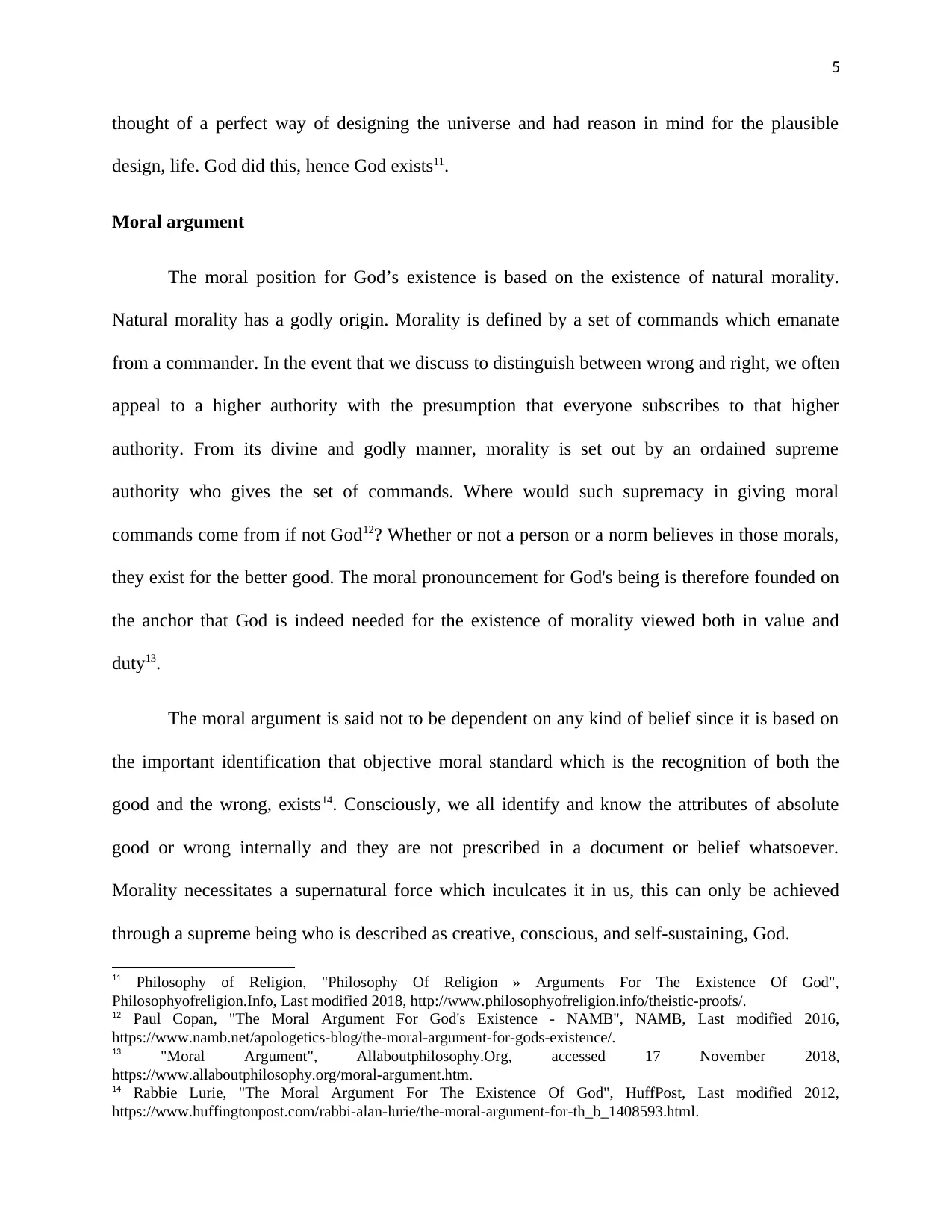
5
thought of a perfect way of designing the universe and had reason in mind for the plausible
design, life. God did this, hence God exists11.
Moral argument
The moral position for God’s existence is based on the existence of natural morality.
Natural morality has a godly origin. Morality is defined by a set of commands which emanate
from a commander. In the event that we discuss to distinguish between wrong and right, we often
appeal to a higher authority with the presumption that everyone subscribes to that higher
authority. From its divine and godly manner, morality is set out by an ordained supreme
authority who gives the set of commands. Where would such supremacy in giving moral
commands come from if not God12? Whether or not a person or a norm believes in those morals,
they exist for the better good. The moral pronouncement for God's being is therefore founded on
the anchor that God is indeed needed for the existence of morality viewed both in value and
duty13.
The moral argument is said not to be dependent on any kind of belief since it is based on
the important identification that objective moral standard which is the recognition of both the
good and the wrong, exists14. Consciously, we all identify and know the attributes of absolute
good or wrong internally and they are not prescribed in a document or belief whatsoever.
Morality necessitates a supernatural force which inculcates it in us, this can only be achieved
through a supreme being who is described as creative, conscious, and self-sustaining, God.
11 Philosophy of Religion, "Philosophy Of Religion » Arguments For The Existence Of God",
Philosophyofreligion.Info, Last modified 2018, http://www.philosophyofreligion.info/theistic-proofs/.
12 Paul Copan, "The Moral Argument For God's Existence - NAMB", NAMB, Last modified 2016,
https://www.namb.net/apologetics-blog/the-moral-argument-for-gods-existence/.
13 "Moral Argument", Allaboutphilosophy.Org, accessed 17 November 2018,
https://www.allaboutphilosophy.org/moral-argument.htm.
14 Rabbie Lurie, "The Moral Argument For The Existence Of God", HuffPost, Last modified 2012,
https://www.huffingtonpost.com/rabbi-alan-lurie/the-moral-argument-for-th_b_1408593.html.
thought of a perfect way of designing the universe and had reason in mind for the plausible
design, life. God did this, hence God exists11.
Moral argument
The moral position for God’s existence is based on the existence of natural morality.
Natural morality has a godly origin. Morality is defined by a set of commands which emanate
from a commander. In the event that we discuss to distinguish between wrong and right, we often
appeal to a higher authority with the presumption that everyone subscribes to that higher
authority. From its divine and godly manner, morality is set out by an ordained supreme
authority who gives the set of commands. Where would such supremacy in giving moral
commands come from if not God12? Whether or not a person or a norm believes in those morals,
they exist for the better good. The moral pronouncement for God's being is therefore founded on
the anchor that God is indeed needed for the existence of morality viewed both in value and
duty13.
The moral argument is said not to be dependent on any kind of belief since it is based on
the important identification that objective moral standard which is the recognition of both the
good and the wrong, exists14. Consciously, we all identify and know the attributes of absolute
good or wrong internally and they are not prescribed in a document or belief whatsoever.
Morality necessitates a supernatural force which inculcates it in us, this can only be achieved
through a supreme being who is described as creative, conscious, and self-sustaining, God.
11 Philosophy of Religion, "Philosophy Of Religion » Arguments For The Existence Of God",
Philosophyofreligion.Info, Last modified 2018, http://www.philosophyofreligion.info/theistic-proofs/.
12 Paul Copan, "The Moral Argument For God's Existence - NAMB", NAMB, Last modified 2016,
https://www.namb.net/apologetics-blog/the-moral-argument-for-gods-existence/.
13 "Moral Argument", Allaboutphilosophy.Org, accessed 17 November 2018,
https://www.allaboutphilosophy.org/moral-argument.htm.
14 Rabbie Lurie, "The Moral Argument For The Existence Of God", HuffPost, Last modified 2012,
https://www.huffingtonpost.com/rabbi-alan-lurie/the-moral-argument-for-th_b_1408593.html.
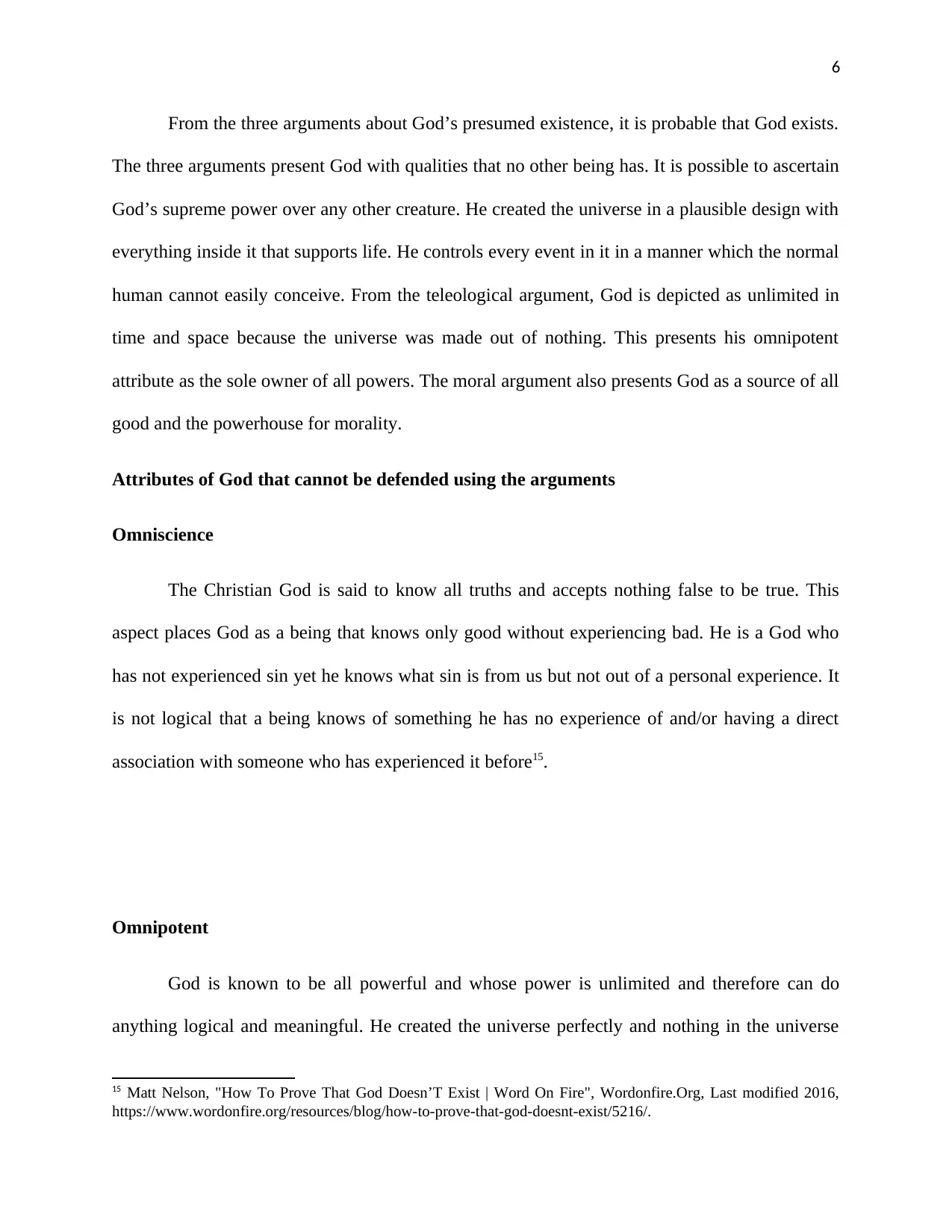
6
From the three arguments about God’s presumed existence, it is probable that God exists.
The three arguments present God with qualities that no other being has. It is possible to ascertain
God’s supreme power over any other creature. He created the universe in a plausible design with
everything inside it that supports life. He controls every event in it in a manner which the normal
human cannot easily conceive. From the teleological argument, God is depicted as unlimited in
time and space because the universe was made out of nothing. This presents his omnipotent
attribute as the sole owner of all powers. The moral argument also presents God as a source of all
good and the powerhouse for morality.
Attributes of God that cannot be defended using the arguments
Omniscience
The Christian God is said to know all truths and accepts nothing false to be true. This
aspect places God as a being that knows only good without experiencing bad. He is a God who
has not experienced sin yet he knows what sin is from us but not out of a personal experience. It
is not logical that a being knows of something he has no experience of and/or having a direct
association with someone who has experienced it before15.
Omnipotent
God is known to be all powerful and whose power is unlimited and therefore can do
anything logical and meaningful. He created the universe perfectly and nothing in the universe
15 Matt Nelson, "How To Prove That God Doesn’T Exist | Word On Fire", Wordonfire.Org, Last modified 2016,
https://www.wordonfire.org/resources/blog/how-to-prove-that-god-doesnt-exist/5216/.
From the three arguments about God’s presumed existence, it is probable that God exists.
The three arguments present God with qualities that no other being has. It is possible to ascertain
God’s supreme power over any other creature. He created the universe in a plausible design with
everything inside it that supports life. He controls every event in it in a manner which the normal
human cannot easily conceive. From the teleological argument, God is depicted as unlimited in
time and space because the universe was made out of nothing. This presents his omnipotent
attribute as the sole owner of all powers. The moral argument also presents God as a source of all
good and the powerhouse for morality.
Attributes of God that cannot be defended using the arguments
Omniscience
The Christian God is said to know all truths and accepts nothing false to be true. This
aspect places God as a being that knows only good without experiencing bad. He is a God who
has not experienced sin yet he knows what sin is from us but not out of a personal experience. It
is not logical that a being knows of something he has no experience of and/or having a direct
association with someone who has experienced it before15.
Omnipotent
God is known to be all powerful and whose power is unlimited and therefore can do
anything logical and meaningful. He created the universe perfectly and nothing in the universe
15 Matt Nelson, "How To Prove That God Doesn’T Exist | Word On Fire", Wordonfire.Org, Last modified 2016,
https://www.wordonfire.org/resources/blog/how-to-prove-that-god-doesnt-exist/5216/.
⊘ This is a preview!⊘
Do you want full access?
Subscribe today to unlock all pages.

Trusted by 1+ million students worldwide
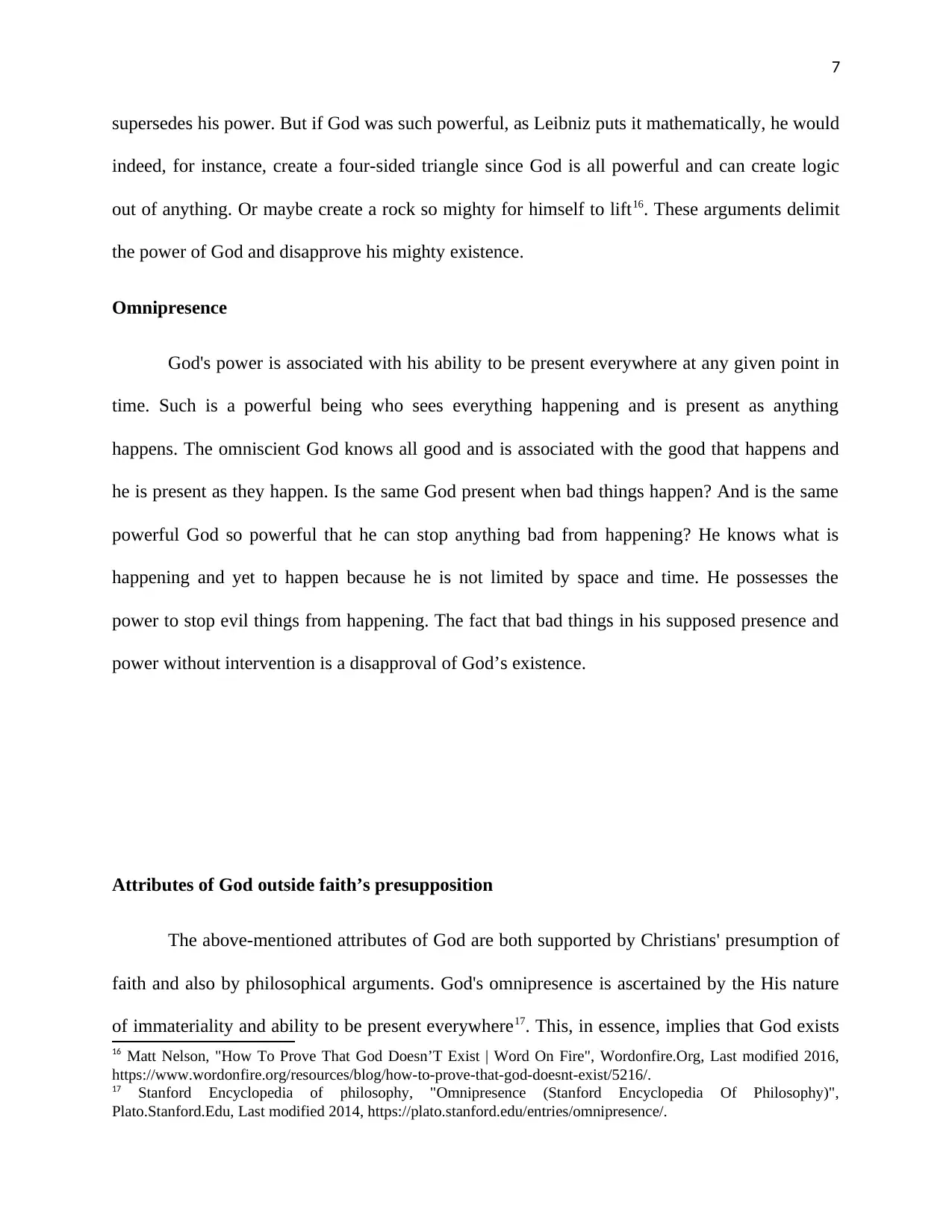
7
supersedes his power. But if God was such powerful, as Leibniz puts it mathematically, he would
indeed, for instance, create a four-sided triangle since God is all powerful and can create logic
out of anything. Or maybe create a rock so mighty for himself to lift16. These arguments delimit
the power of God and disapprove his mighty existence.
Omnipresence
God's power is associated with his ability to be present everywhere at any given point in
time. Such is a powerful being who sees everything happening and is present as anything
happens. The omniscient God knows all good and is associated with the good that happens and
he is present as they happen. Is the same God present when bad things happen? And is the same
powerful God so powerful that he can stop anything bad from happening? He knows what is
happening and yet to happen because he is not limited by space and time. He possesses the
power to stop evil things from happening. The fact that bad things in his supposed presence and
power without intervention is a disapproval of God’s existence.
Attributes of God outside faith’s presupposition
The above-mentioned attributes of God are both supported by Christians' presumption of
faith and also by philosophical arguments. God's omnipresence is ascertained by the His nature
of immateriality and ability to be present everywhere17. This, in essence, implies that God exists
16 Matt Nelson, "How To Prove That God Doesn’T Exist | Word On Fire", Wordonfire.Org, Last modified 2016,
https://www.wordonfire.org/resources/blog/how-to-prove-that-god-doesnt-exist/5216/.
17 Stanford Encyclopedia of philosophy, "Omnipresence (Stanford Encyclopedia Of Philosophy)",
Plato.Stanford.Edu, Last modified 2014, https://plato.stanford.edu/entries/omnipresence/.
supersedes his power. But if God was such powerful, as Leibniz puts it mathematically, he would
indeed, for instance, create a four-sided triangle since God is all powerful and can create logic
out of anything. Or maybe create a rock so mighty for himself to lift16. These arguments delimit
the power of God and disapprove his mighty existence.
Omnipresence
God's power is associated with his ability to be present everywhere at any given point in
time. Such is a powerful being who sees everything happening and is present as anything
happens. The omniscient God knows all good and is associated with the good that happens and
he is present as they happen. Is the same God present when bad things happen? And is the same
powerful God so powerful that he can stop anything bad from happening? He knows what is
happening and yet to happen because he is not limited by space and time. He possesses the
power to stop evil things from happening. The fact that bad things in his supposed presence and
power without intervention is a disapproval of God’s existence.
Attributes of God outside faith’s presupposition
The above-mentioned attributes of God are both supported by Christians' presumption of
faith and also by philosophical arguments. God's omnipresence is ascertained by the His nature
of immateriality and ability to be present everywhere17. This, in essence, implies that God exists
16 Matt Nelson, "How To Prove That God Doesn’T Exist | Word On Fire", Wordonfire.Org, Last modified 2016,
https://www.wordonfire.org/resources/blog/how-to-prove-that-god-doesnt-exist/5216/.
17 Stanford Encyclopedia of philosophy, "Omnipresence (Stanford Encyclopedia Of Philosophy)",
Plato.Stanford.Edu, Last modified 2014, https://plato.stanford.edu/entries/omnipresence/.
Paraphrase This Document
Need a fresh take? Get an instant paraphrase of this document with our AI Paraphraser
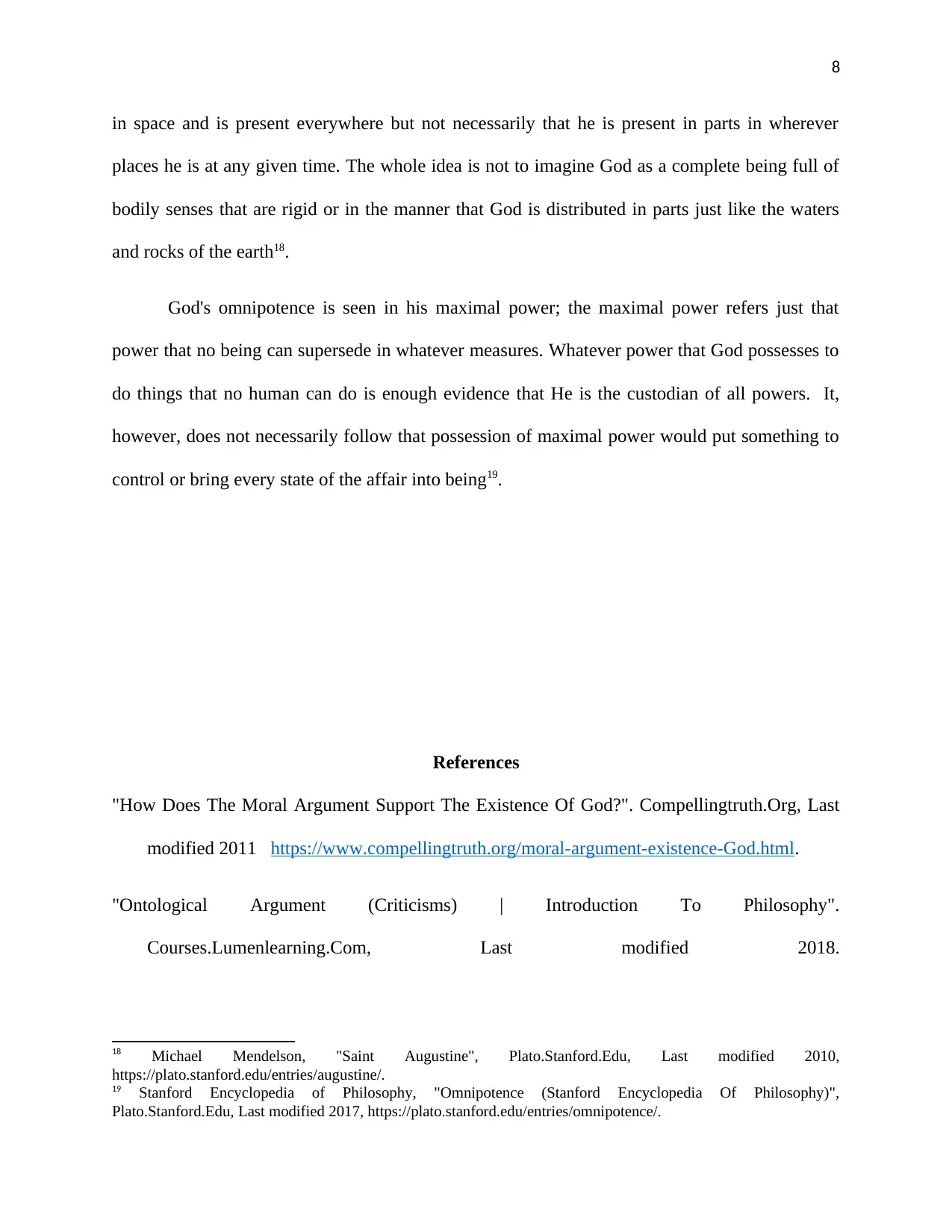
8
in space and is present everywhere but not necessarily that he is present in parts in wherever
places he is at any given time. The whole idea is not to imagine God as a complete being full of
bodily senses that are rigid or in the manner that God is distributed in parts just like the waters
and rocks of the earth18.
God's omnipotence is seen in his maximal power; the maximal power refers just that
power that no being can supersede in whatever measures. Whatever power that God possesses to
do things that no human can do is enough evidence that He is the custodian of all powers. It,
however, does not necessarily follow that possession of maximal power would put something to
control or bring every state of the affair into being19.
References
"How Does The Moral Argument Support The Existence Of God?". Compellingtruth.Org, Last
modified 2011 https://www.compellingtruth.org/moral-argument-existence-God.html.
"Ontological Argument (Criticisms) | Introduction To Philosophy".
Courses.Lumenlearning.Com, Last modified 2018.
18 Michael Mendelson, "Saint Augustine", Plato.Stanford.Edu, Last modified 2010,
https://plato.stanford.edu/entries/augustine/.
19 Stanford Encyclopedia of Philosophy, "Omnipotence (Stanford Encyclopedia Of Philosophy)",
Plato.Stanford.Edu, Last modified 2017, https://plato.stanford.edu/entries/omnipotence/.
in space and is present everywhere but not necessarily that he is present in parts in wherever
places he is at any given time. The whole idea is not to imagine God as a complete being full of
bodily senses that are rigid or in the manner that God is distributed in parts just like the waters
and rocks of the earth18.
God's omnipotence is seen in his maximal power; the maximal power refers just that
power that no being can supersede in whatever measures. Whatever power that God possesses to
do things that no human can do is enough evidence that He is the custodian of all powers. It,
however, does not necessarily follow that possession of maximal power would put something to
control or bring every state of the affair into being19.
References
"How Does The Moral Argument Support The Existence Of God?". Compellingtruth.Org, Last
modified 2011 https://www.compellingtruth.org/moral-argument-existence-God.html.
"Ontological Argument (Criticisms) | Introduction To Philosophy".
Courses.Lumenlearning.Com, Last modified 2018.
18 Michael Mendelson, "Saint Augustine", Plato.Stanford.Edu, Last modified 2010,
https://plato.stanford.edu/entries/augustine/.
19 Stanford Encyclopedia of Philosophy, "Omnipotence (Stanford Encyclopedia Of Philosophy)",
Plato.Stanford.Edu, Last modified 2017, https://plato.stanford.edu/entries/omnipotence/.
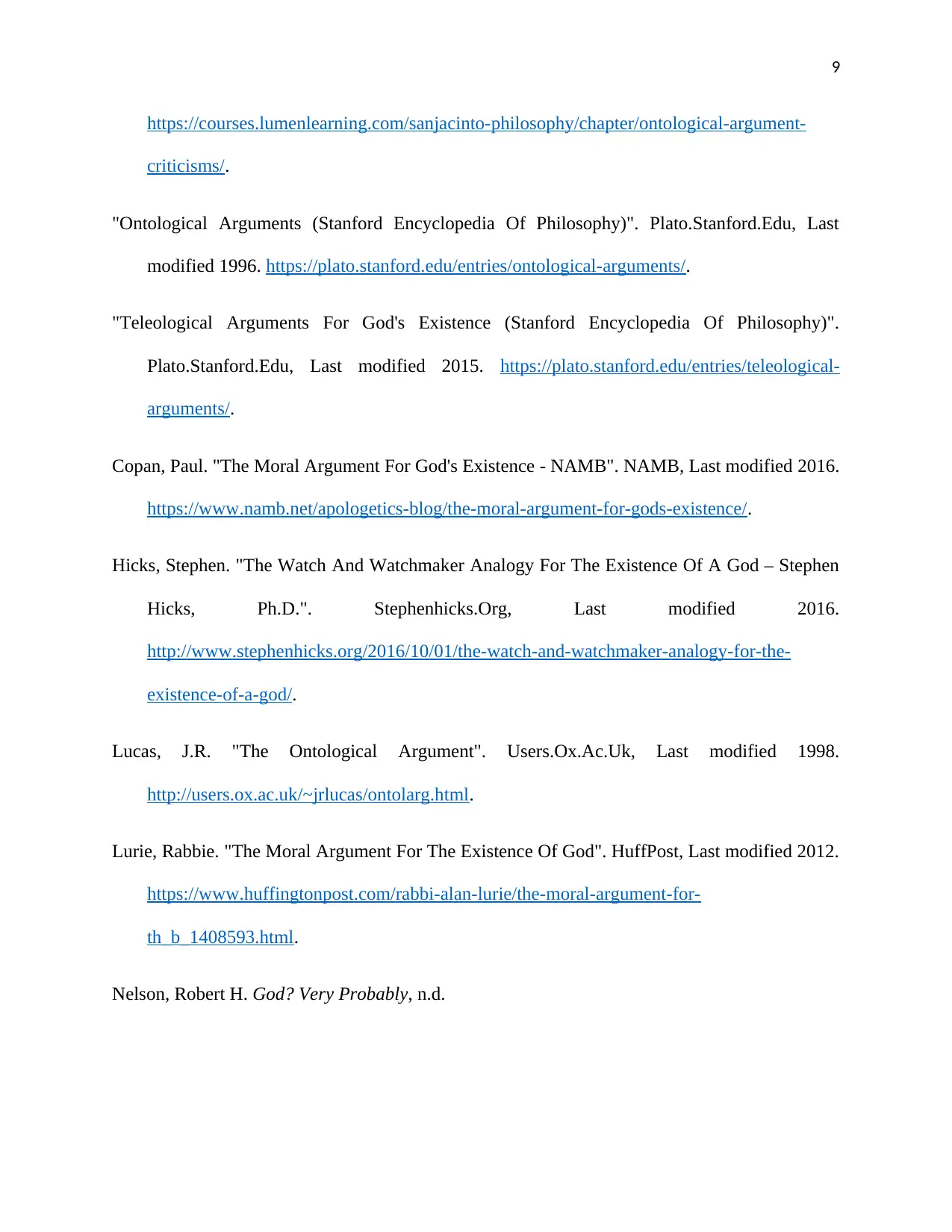
9
https://courses.lumenlearning.com/sanjacinto-philosophy/chapter/ontological-argument-
criticisms/.
"Ontological Arguments (Stanford Encyclopedia Of Philosophy)". Plato.Stanford.Edu, Last
modified 1996. https://plato.stanford.edu/entries/ontological-arguments/.
"Teleological Arguments For God's Existence (Stanford Encyclopedia Of Philosophy)".
Plato.Stanford.Edu, Last modified 2015. https://plato.stanford.edu/entries/teleological-
arguments/.
Copan, Paul. "The Moral Argument For God's Existence - NAMB". NAMB, Last modified 2016.
https://www.namb.net/apologetics-blog/the-moral-argument-for-gods-existence/.
Hicks, Stephen. "The Watch And Watchmaker Analogy For The Existence Of A God – Stephen
Hicks, Ph.D.". Stephenhicks.Org, Last modified 2016.
http://www.stephenhicks.org/2016/10/01/the-watch-and-watchmaker-analogy-for-the-
existence-of-a-god/.
Lucas, J.R. "The Ontological Argument". Users.Ox.Ac.Uk, Last modified 1998.
http://users.ox.ac.uk/~jrlucas/ontolarg.html.
Lurie, Rabbie. "The Moral Argument For The Existence Of God". HuffPost, Last modified 2012.
https://www.huffingtonpost.com/rabbi-alan-lurie/the-moral-argument-for-
th_b_1408593.html.
Nelson, Robert H. God? Very Probably, n.d.
https://courses.lumenlearning.com/sanjacinto-philosophy/chapter/ontological-argument-
criticisms/.
"Ontological Arguments (Stanford Encyclopedia Of Philosophy)". Plato.Stanford.Edu, Last
modified 1996. https://plato.stanford.edu/entries/ontological-arguments/.
"Teleological Arguments For God's Existence (Stanford Encyclopedia Of Philosophy)".
Plato.Stanford.Edu, Last modified 2015. https://plato.stanford.edu/entries/teleological-
arguments/.
Copan, Paul. "The Moral Argument For God's Existence - NAMB". NAMB, Last modified 2016.
https://www.namb.net/apologetics-blog/the-moral-argument-for-gods-existence/.
Hicks, Stephen. "The Watch And Watchmaker Analogy For The Existence Of A God – Stephen
Hicks, Ph.D.". Stephenhicks.Org, Last modified 2016.
http://www.stephenhicks.org/2016/10/01/the-watch-and-watchmaker-analogy-for-the-
existence-of-a-god/.
Lucas, J.R. "The Ontological Argument". Users.Ox.Ac.Uk, Last modified 1998.
http://users.ox.ac.uk/~jrlucas/ontolarg.html.
Lurie, Rabbie. "The Moral Argument For The Existence Of God". HuffPost, Last modified 2012.
https://www.huffingtonpost.com/rabbi-alan-lurie/the-moral-argument-for-
th_b_1408593.html.
Nelson, Robert H. God? Very Probably, n.d.
⊘ This is a preview!⊘
Do you want full access?
Subscribe today to unlock all pages.

Trusted by 1+ million students worldwide
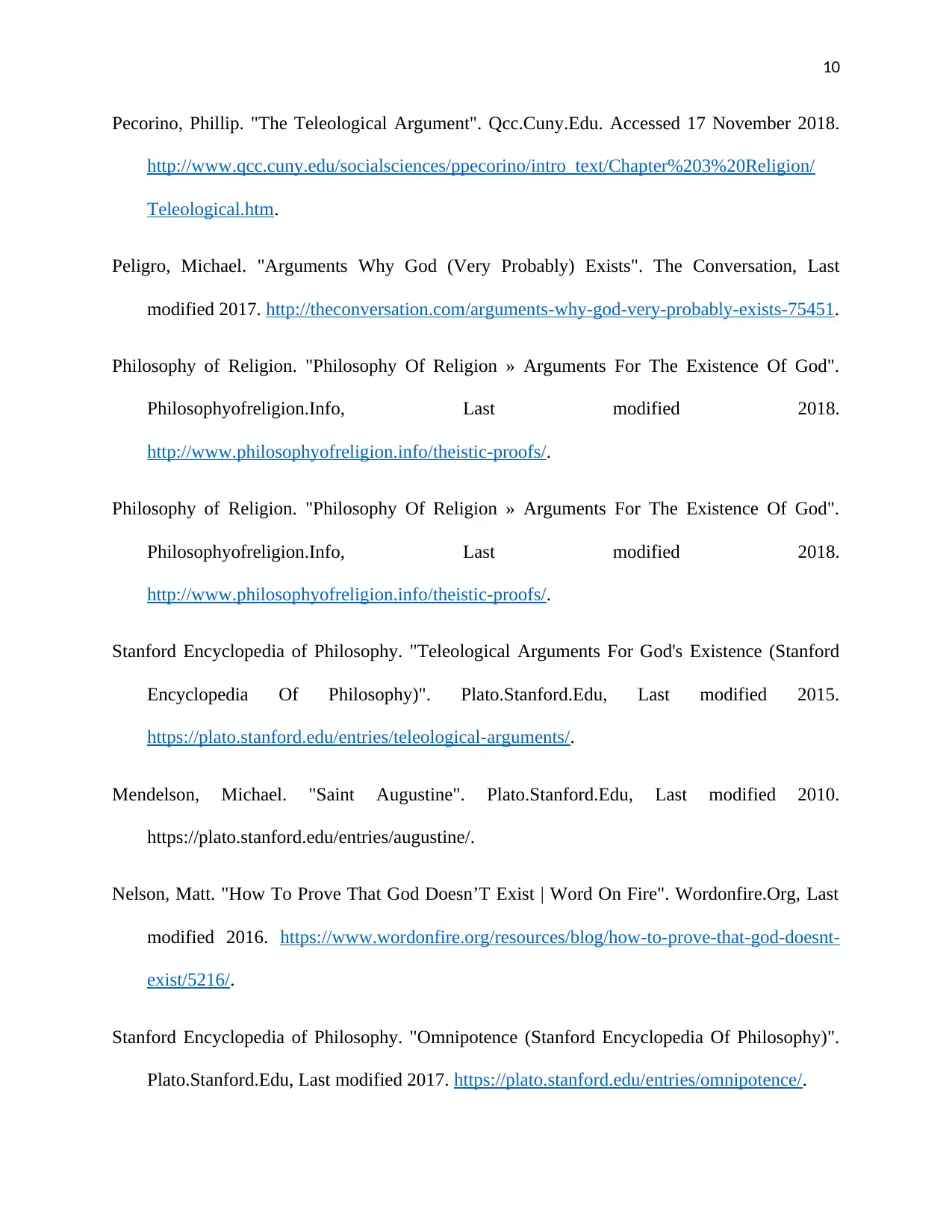
10
Pecorino, Phillip. "The Teleological Argument". Qcc.Cuny.Edu. Accessed 17 November 2018.
http://www.qcc.cuny.edu/socialsciences/ppecorino/intro_text/Chapter%203%20Religion/
Teleological.htm.
Peligro, Michael. "Arguments Why God (Very Probably) Exists". The Conversation, Last
modified 2017. http://theconversation.com/arguments-why-god-very-probably-exists-75451.
Philosophy of Religion. "Philosophy Of Religion » Arguments For The Existence Of God".
Philosophyofreligion.Info, Last modified 2018.
http://www.philosophyofreligion.info/theistic-proofs/.
Philosophy of Religion. "Philosophy Of Religion » Arguments For The Existence Of God".
Philosophyofreligion.Info, Last modified 2018.
http://www.philosophyofreligion.info/theistic-proofs/.
Stanford Encyclopedia of Philosophy. "Teleological Arguments For God's Existence (Stanford
Encyclopedia Of Philosophy)". Plato.Stanford.Edu, Last modified 2015.
https://plato.stanford.edu/entries/teleological-arguments/.
Mendelson, Michael. "Saint Augustine". Plato.Stanford.Edu, Last modified 2010.
https://plato.stanford.edu/entries/augustine/.
Nelson, Matt. "How To Prove That God Doesn’T Exist | Word On Fire". Wordonfire.Org, Last
modified 2016. https://www.wordonfire.org/resources/blog/how-to-prove-that-god-doesnt-
exist/5216/.
Stanford Encyclopedia of Philosophy. "Omnipotence (Stanford Encyclopedia Of Philosophy)".
Plato.Stanford.Edu, Last modified 2017. https://plato.stanford.edu/entries/omnipotence/.
Pecorino, Phillip. "The Teleological Argument". Qcc.Cuny.Edu. Accessed 17 November 2018.
http://www.qcc.cuny.edu/socialsciences/ppecorino/intro_text/Chapter%203%20Religion/
Teleological.htm.
Peligro, Michael. "Arguments Why God (Very Probably) Exists". The Conversation, Last
modified 2017. http://theconversation.com/arguments-why-god-very-probably-exists-75451.
Philosophy of Religion. "Philosophy Of Religion » Arguments For The Existence Of God".
Philosophyofreligion.Info, Last modified 2018.
http://www.philosophyofreligion.info/theistic-proofs/.
Philosophy of Religion. "Philosophy Of Religion » Arguments For The Existence Of God".
Philosophyofreligion.Info, Last modified 2018.
http://www.philosophyofreligion.info/theistic-proofs/.
Stanford Encyclopedia of Philosophy. "Teleological Arguments For God's Existence (Stanford
Encyclopedia Of Philosophy)". Plato.Stanford.Edu, Last modified 2015.
https://plato.stanford.edu/entries/teleological-arguments/.
Mendelson, Michael. "Saint Augustine". Plato.Stanford.Edu, Last modified 2010.
https://plato.stanford.edu/entries/augustine/.
Nelson, Matt. "How To Prove That God Doesn’T Exist | Word On Fire". Wordonfire.Org, Last
modified 2016. https://www.wordonfire.org/resources/blog/how-to-prove-that-god-doesnt-
exist/5216/.
Stanford Encyclopedia of Philosophy. "Omnipotence (Stanford Encyclopedia Of Philosophy)".
Plato.Stanford.Edu, Last modified 2017. https://plato.stanford.edu/entries/omnipotence/.
Paraphrase This Document
Need a fresh take? Get an instant paraphrase of this document with our AI Paraphraser

11
Stanford Encyclopedia of philosophy. "Omnipresence (Stanford Encyclopedia Of Philosophy)".
Plato.Stanford.Edu, Last modified 2014. https://plato.stanford.edu/entries/omnipresence/.
"Moral Argument". Allaboutphilosophy.Org. Accessed 17 November 2018.
https://www.allaboutphilosophy.org/moral-argument.htm.
Stanford Encyclopedia of philosophy. "Omnipresence (Stanford Encyclopedia Of Philosophy)".
Plato.Stanford.Edu, Last modified 2014. https://plato.stanford.edu/entries/omnipresence/.
"Moral Argument". Allaboutphilosophy.Org. Accessed 17 November 2018.
https://www.allaboutphilosophy.org/moral-argument.htm.
1 out of 11
Related Documents
Your All-in-One AI-Powered Toolkit for Academic Success.
+13062052269
info@desklib.com
Available 24*7 on WhatsApp / Email
![[object Object]](/_next/static/media/star-bottom.7253800d.svg)
Unlock your academic potential
Copyright © 2020–2025 A2Z Services. All Rights Reserved. Developed and managed by ZUCOL.





